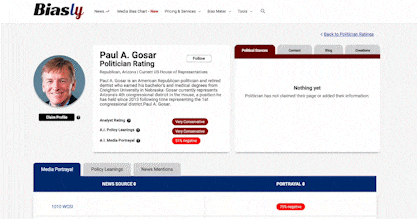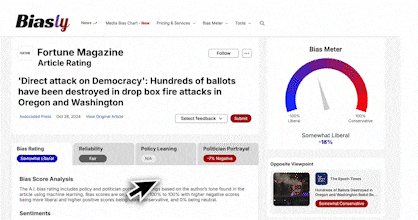Tariffs may be just the start of U.S.-China disputes in a second Trump term
- Bias Rating
10% Center
- Reliability
75% ReliableGood
- Policy Leaning
10% Center
- Politician Portrayal
-17% Negative
Continue For Free
Create your free account to see the in-depth bias analytics and more.
Continue
Continue
By creating an account, you agree to our Terms and Privacy Policy, and subscribe to email updates. Already a member: Log inBias Score Analysis
The A.I. bias rating includes policy and politician portrayal leanings based on the author’s tone found in the article using machine learning. Bias scores are on a scale of -100% to 100% with higher negative scores being more liberal and higher positive scores being more conservative, and 0% being neutral.
Sentiments
2% Positive
- Liberal
- Conservative
| Sentence | Sentiment | Bias |
|---|---|---|
Unlock this feature by upgrading to the Pro plan. | ||
Reliability Score Analysis
Policy Leaning Analysis
Politician Portrayal Analysis
Bias Meter
Extremely
Liberal
Very
Liberal
Moderately
Liberal
Somewhat Liberal
Center
Somewhat Conservative
Moderately
Conservative
Very
Conservative
Extremely
Conservative
-100%
Liberal
100%
Conservative

Contributing sentiments towards policy:
62% : On Tuesday, Trump said his nominee for U.S. trade representative was Jamieson Greer, who helped implement China tariffs during Trump's first term as chief of staff to Robert Lighthizer, the U.S. trade representative at the time.52% : Trump already rattled global markets this week by saying he would begin his term in office with a 10% tariff on Chinese goods, in addition to higher tariffs on goods from Canada and Mexico.
50% : He said Trump and Xi should try to meet as soon as possible, citing what Trump describes as his strong relationship with the Chinese leader.
50% : Trump "still wants to get concessions from China, he wants to get benefits from China," Wu said.
47% : " It's unclear just how much Trump will be influenced by his advisers.
46% : But in a seeming message to Trump, he emphasized China's four "red lines" in its U.S. relations: Taiwan, the promotion of democracy and human rights, efforts to undermine the ruling Chinese Communist Party, and constraining China's development.
40% : Incoming White House press secretary Karoline Leavitt said that Trump was elected "to stand up to China, enforce tariffs on Chinese goods, and Make America Strong Again.
39% : His selection by Trump "has instilled some confidence in pro-democracy communities in China and the diaspora, as Rubio is known for his strong objections to Beijing's human rights abuses," Yaqiu Wang, the research director for China, Hong Kong and Taiwan at Freedom House, a Washington think tank, wrote in The Diplomat on Tuesday. Waltz, who does not need to be confirmed by the Senate, had called on the U.S. to boycott the 2022 Winter Olympics in Beijing, citing human rights abuses, while Hegseth, a Fox News host, has said China aspires to global domination.
35% : But if Trump does impose extremely high tariffs or take other measures, Beijing could "make things challenging for the U.S. as well," he said.
35% : Experts say Trump may be more transactional in how he deals with China and Taiwan than his advisers, whose approach tends to be more ideological.
34% : What direction that relationship takes now, experts say, will depend on the extent to which Trump follows through on his vow to slap China with steep tariffs -- as well as how strongly he is influenced by advisers who think the U.S. should confront China on far more than trade.
30% : Trump is not dealing with the same China as when he left office four years ago.
17% : But Trump and his aides also have major differences in their approach to China, including whether to ban the Chinese-owned app TikTok, which Trump supported before reversing his position this year.
17% : Trump has unnerved Taiwanese officials by saying the island doesn't pay enough for its defense and accusing it of "stealing" business from the U.S. with its semiconductor industry.
*Our bias meter rating uses data science including sentiment analysis, machine learning and our proprietary algorithm for determining biases in news articles. Bias scores are on a scale of -100% to 100% with higher negative scores being more liberal and higher positive scores being more conservative, and 0% being neutral. The rating is an independent analysis and is not affiliated nor sponsored by the news source or any other organization.

























 NBC News
NBC News


